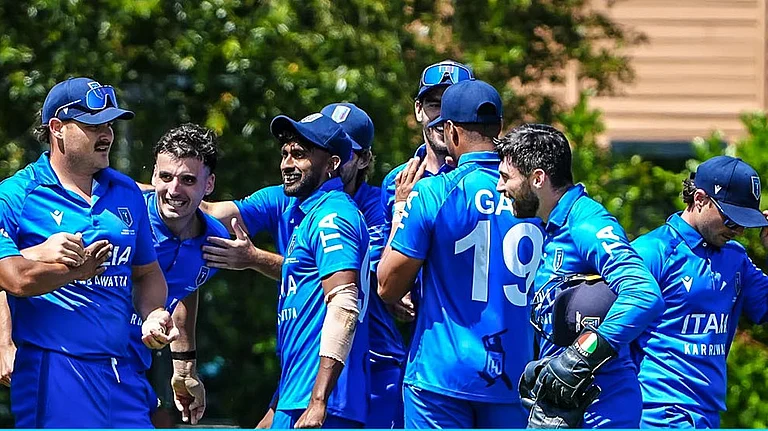The first story, Paradise, is the most ambitious and least successful. The narrator is a thirtysomething New York Jewish woman who comes to an ashram in the hills above Haridwar to escape from a life of over-indulgence. She succeeds for a couple of months, sitting at the feet of a bald man in saffron robes, and learning yoga. And then, on one bewilderingly hyperactive monsoon day, she heads for Haridwar, smokes ganja, kisses a sadhu’s penis, gets drunk on gin, and has wild lesbian sex with a minute Gujarati woman called Putli. I failed to suspend my disbelief. Suddenly, the authorial ‘I’ of Khushwant Singh, grand old man of Indian letters, has changed gender, race, religion, nationality and has become three generations younger; and yet is still as interested in breasts as ever, and even gets to throw a book at the erect penis of an unwanted and drunken admirer.
The stories do get a lot better. Life’s Horoscope is cruelly funny in a manner which only Khushwant Singh can get away with. Madan Mohan Pandey, a believer in astrology and advocate of Vedic science, prepares for his wedding night by studying the Kamasutra. He wonders how to go about measuring the size of his wife’s vagina so as to know whether she is a doe (mrigini) or an elephant (hasthini); he asks himself, ingenuously, if there is such a thing as a vaginal dipstick. Then, the marriage ceremony over, he informs his wife that according to the Kamasutra they can only have sex on their third night together. She protests, to no avail—and it all climaxes three days later, both the marriage and the story, with a rather predictable premature ejaculation. A few pages on, the marriage is over and the bridegroom’s mother decides that he should become a politician. It doesn’t matter that none of the characters are particularly credible. This is polemical short-story writing at its most entertaining; a blistering lampoon of an rss pracharak, at which even the stoutest defender of Hindutva would have to laugh (in private, at least).
The best story, The Mulberry Tree, has a more than credible central character who doesn’t even get as far as premature ejaculation. Vijay Lall is a lonely, 54-year-old freelance columnist who lives, like Khushwant Singh, near Delhi’s Khan Market. He becomes infatuated with a woman (with "shapely breasts and an impressive posterior that protruded invitingly") who wears bright red sandals. It is one of those short stories where not a great deal happens, but where the author evokes a memorable sense of place. Khan Market is seen at several levels—a haven for book lovers, a home for Punjabi refugee-shopkeepers, a magnet for artichoke- and broccoli-seeking foreigners, and a place of daily pilgrimage for local Muslims and for Krishna devotees. It also becomes a stage on which tiny life-dramas are enacted, as Vijay Lall’s fantasies are created and dashed. The story also contains an all-but-infallible recipe for seduction. No—I won’t tell you. You’ll have to buy the book.
To some of his critics, Khushwant Singh is a dirty old man with a few axes to grind. I hope that is not how he will be remembered. He is a first-rate historian and journalist. His fiction, at its very best, as in his first novel, The Train to Pakistan, combines that sense of place with a real understanding of how social and political change affects ordinary lives. His prose is simple and direct—there is no circumlocution; he has no fear of the short sentence. Like the late Dom Moraes (who could also, occasionally, write like an angel), he is obsessed with women’s breasts (were they not suckled for long enough?). But Singh’s more general preoccupation with sex should be seen as a challenge to the hypocrisy that surrounds this subject. After all, modern India is an outcome of more than a billion individual acts of sexual intercourse; then there are many billions more that left no progeny. Now, there’s a subject for Khushwant Singh’s next bestseller.


























